|
|
|
Sort Order |
|
|
|
Items / Page
|
|
|
|
|
|
|
| Srl | Item |
| 1 |
ID:
073550
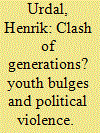

|
|
|
|
|
| Publication |
2006.
|
| Summary/Abstract |
It has frequently been suggested that exceptionally large youth cohorts, the so-called "youth bulges," make countries more susceptible to political violence. Within two prominent theoretical frameworks in the study of civil war, youth bulges are argued to potentially increase both opportunities and motives for political violence. This claim is empirically tested in a time-series cross-national statistical model for internal armed conflict for the period 1950-2000, and for event data for terrorism and rioting for the years 1984-1995. The expectation that youth bulges should increase the risk of political violence receives robust support for all three forms of violence. The results are consistent both with an expectation that youth bulges provide greater opportunities for violence through the abundant supply of youths with low opportunity costs, and with an expectation that stronger motives for violence may arise as youth bulges are more likely to experience institutional crowding, in particular unemployment. Some contextual factors have been suggested to potentially enhance the effect of youth bulges. In an empirical test of these propositions, the study suggests that youth bulges are particularly associated with an increasing risk of internal armed conflict in starkly autocratic regimes, but a similar effect is also found for highly democratic countries. The interaction of youth bulges with economic decline and expansion in higher education appear to increase the risk of terrorism but not of rioting. Recent studies in economic demography find that when fertility is sharply decreasing, causing lower dependency ratios, large youth cohorts entering the labor market may lead to economic boosts. This study finds some empirical evidence complementing these results, indicating that the effect of youth bulges on political violence may decline along with reduced dependency ratios.
|
|
|
|
|
|
|
|
|
|
|
|
|
|
|
|
| 2 |
ID:
073546
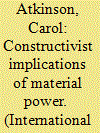

|
|
|
|
|
| Publication |
2006.
|
| Summary/Abstract |
The research presented in this article examines one aspect of state socialization, the extent to which transnational military-to-military interactions have served as an effective mechanism of the democratic political socialization of states. Military organizations are very interesting when we consider avenues by which state socialization might occur because military organizations are an influential part of governments, and members share common beliefs and values as soldiers and officers that transcend borders. Thus, it would seem that a state's military structure is one likely channel whereby politically relevant individuals might learn new ideas and have the capability to reform existing institutional structures. The socialization process described in this study is three level: (1) individuals acquire new ideas; (2) coercion, incentives, and persuasion aid in institutionalizing these ideas in the underlying political structure of the state; and (3) once institutionalized, these new ideas/identity of the state influence the material and ideational structure of international society. Using Cox Proportional Hazard models and an original data set encompassing over 160 states during the years 1972-2000, the analyses find U.S. military-to-military contacts to be positively and systematically associated with liberalizing trends. This finding provides evidence that constructivist mechanisms do have observable effects, and that ideationally based processes play an important role in U.S. national security.
|
|
|
|
|
|
|
|
|
|
|
|
|
|
|
|
| 3 |
ID:
073553


|
|
|
|
|
| Publication |
2006.
|
| Summary/Abstract |
A recent article using the new Correlates of War (COW) data on the distribution of interstate, intrastate, and extrastate wars from 1816 to 1997 claims there was a relatively constant risk of death in battle during that time. We show that the authors' information is skewed by irregularities in the COW deaths data, and contest their pessimistic interpretation. Using revised information on battle deaths from 1900 to 2002 we demonstrate that the risk of death in battle by no means followed a flat line, but rather declined significantly after World War II and again after the end of the Cold War. Future users should note that the deaths data collected for the three conflict types by COW are not comparable, and using them as such tends to underestimate the share of fatalities due to major interstate conflicts.
|
|
|
|
|
|
|
|
|
|
|
|
|
|
|
|
| 4 |
ID:
073548
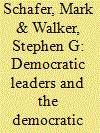

|
|
|
|
|
| Publication |
2006.
|
| Summary/Abstract |
Do the beliefs of leaders make a significant difference in determining if democracies are peaceful and explaining why democracies (almost) never fight one another? Our comparisons of Prime Minister Tony Blair and President Bill Clinton reveal that both leaders view democracies as more friendly than nondemocracies, and they have significantly less cooperative beliefs toward the latter than toward the former, a difference that extends to the behavior of their respective governments during the Kosovo conflict. We also find that individual differences in the operational codes of the two leaders matter in the management of conflict with nondemocracies; the leaders exhibit opposite leadership styles and behavior associated with the domestic political culture of the two states. Overall, these results support the dyadic version of the democratic peace and suggest that the conflict behavior of democratic states depends upon the beliefs and calculations of their leaders in dealing with nondemocracies.
|
|
|
|
|
|
|
|
|
|
|
|
|
|
|
|
| 5 |
ID:
073549
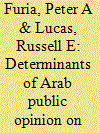

|
|
|
|
|
| Publication |
2006.
|
| Summary/Abstract |
Using Zogby International polling data from seven different Arab nations (Egypt, Jordan, Kuwait, Lebanon, Morocco, Saudi Arabia, and the United Arab Emirates) this paper offers a societal-level quantitative analysis (N=91 dyads) of the determinants of Arab public opinion toward 13 different non-Arab countries (Canada, China, France, Germany, India, Iran, Israel, Japan, Pakistan, Russia, Turkey, the United Kingdom, and the United States). We first explore whether Arab public opinion toward these countries is predicted by general "realist," "liberal," "Marxist," and/or "cultural" hypotheses suggested in the IR/foreign policy literature. After finding few statistically significant relationships among these variables, we present evidence that Arab publics evaluate non-Arab countries on the basis of those countries' specific foreign policy behaviors throughout the wider Middle East (e.g., especially those behaviors affecting Palestine and Iraq). Noting that these evaluations occur in the context of competing identity frames, we provisionally link Arab publics' concerns with "regional" matters to the high salience of "Arabist" identity among respondents to the Zogby survey.
|
|
|
|
|
|
|
|
|
|
|
|
|
|
|
|
| 6 |
ID:
073554
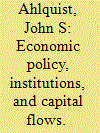

|
|
|
|
|
| Publication |
2006.
|
| Summary/Abstract |
Scholars examining the cross-national mobility of capital have followed two distinct paths. Economists tend to focus on the determinants and economic effects of cross-country capital movements while political scientists largely concentrate on the political impact of capital mobility. This study fills an important gap in the literature by examining the effects of economic policy outcomes on capital inflows to developing countries, explicitly comparing the reactions of portfolio and direct investors. I find that portfolio investors are in fact sensitive to past government behavior and fiscal policy outcomes; portfolio investors reallocate funds as new information about government policy becomes available. Direct investors, on the other hand, are not sensitive to macrolevel economic policy outcomes but are concerned with political institutions. Countries with more stable and democratic political institutions attract more FDI. These findings have implications for developing country governments as they consider the sequence of market liberalizing reforms.
|
|
|
|
|
|
|
|
|
|
|
|
|
|
|
|
| 7 |
ID:
073547
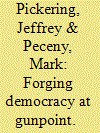

|
|
|
|
|
| Publication |
2006.
|
| Summary/Abstract |
Can liberal interventionism build liberal democracy? This manuscript examines the military interventions undertaken by the U.S., U.K., France, and the UN in the post-World War II era to see if they had a positive impact on democracy in target countries. Empirical analysis centers on multivariate time series, cross section PCSE and relogit regressions of political liberalization and democratization from 1946 to 1996. The former is operationalized with annual difference data drawn from the Polity IV data collection, whereas the latter is a binary variable denoting countries that cross a threshold commonly used to indicate the establishment of democratic institutions. An updated version of the International Military Intervention data set enumerates foreign military interventions. We find little evidence that military intervention by liberal states helps to foster democracy in target countries. Although a few states have democratized in the wake of hostile U.S. military interventions, the small number of cases involved makes it difficult to draw generalizable conclusions from the U.S. record. We find stronger evidence, however, that supportive interventions by the UN's "Blue Helmets" can help to democratize target states.
|
|
|
|
|
|
|
|
|
|
|
|
|
|
|
|
| 8 |
ID:
073552


|
|
|
|
|
| Publication |
2006.
|
| Summary/Abstract |
Studies of global governance typically claim that the state has lost power to nonstate actors and that political authority is increasingly institutionalized in spheres not controlled by states. In this article, we challenge the core claims in the literature on global governance. Rather than focusing on the relative power of states and nonstate actors, we focus on the sociopolitical functions and processes of governance in their own right and seek to identify their rationality as practices of political rule. For this task, we use elements of the conception of power developed by Michel Foucault in his studies of "governmentality." In this perspective, the role of nonstate actors in shaping and carrying out global governance-functions is not an instance of transfer of power from the state to nonstate actors but rather an expression of a changing logic or rationality of government (defined as a type of power) by which civil society is redefined from a passive object of government to be acted upon into an entity that is both an object and a subject of government. The argument is illustrated by two case studies: the international campaign to ban landmines, and international population policy. The cases show that the self-association and political will-formation characteristic of civil society and nonstate actors do not stand in opposition to the political power of the state, but is a most central feature of how power, understood as government, operates in late modern society.
|
|
|
|
|
|
|
|
|
|
|
|
|
|
|
|
| 9 |
ID:
073551
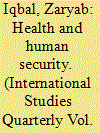

|
|
|
|
|
| Publication |
2006.
|
| Summary/Abstract |
The consequences of violent conflict permeate countless aspects of society, and are not limited to the political and economic institutions of a state. The concept of human security extends traditional, state-centric notions of security to include the security and well-being of people that live within states. Adhering to the human security framework, I examine the effect of militarized conflict on the populations of states by evaluating the relationship between war and public health while taking into account relevant political and economic factors, including democracy and wealth. I argue that interstate and intrastate conflict negatively influences the health achievement of states and, therefore, the human security of their populations. I assess this relationship by analyzing data on summary measures of public health in all states between 1999 and 2001. My analysis suggests that the negative effect of war on health is particularly intense in the short term following the onset of a conflict.
|
|
|
|
|
|
|
|
|
|
|
|
|
|
|
|
| 10 |
ID:
073555


|
|
|
|
|
| Publication |
2006.
|
| Summary/Abstract |
Do presidents incorporate the preferences of the public into their foreign policy decisions? Previous scholarship has begun to sketch out the sources of variation in the policy-public opinion linkage, but we still lack a clear understanding of the factors that increase or decrease presidential responsiveness. To better explore the relationship, we conceptualize presidential foreign policy making as a five-stage process-problem representation, option generation, policy selection, implementation, and policy review-arguing that the degree to which presidents are responsive to public opinion varies with fluctuations in public attentiveness. At stages in which public interest is high, presidents are more likely to incorporate mass preferences into their decision making than during stages of public quiescence. The key finding in our analysis of 34 foreign policy cases is that the public's "issue-attention cycle" varies systematically across foreign policy crises and noncrises. Examining these cycles of attention allows us to make predictions about the conditions under which public opinion is most likely to influence decision making.
|
|
|
|
|
|
|
|
|
|
|
|
|
|
|
|
|
|
|
|
|